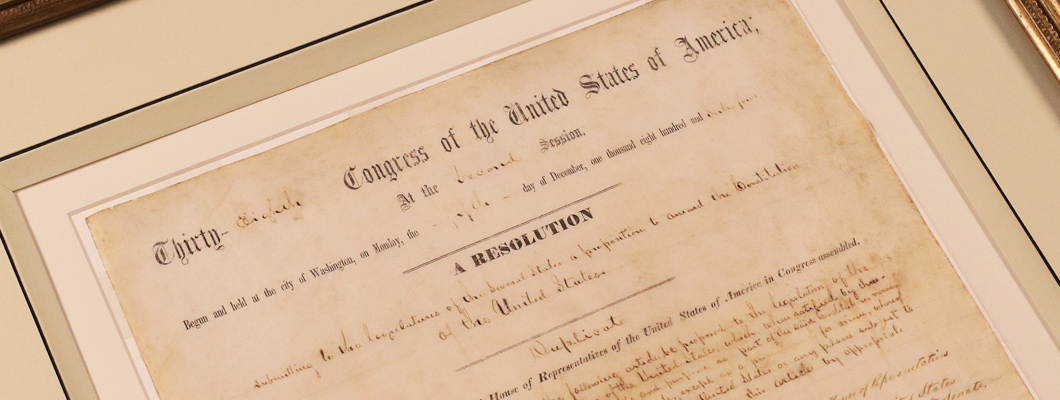The Thirteenth Amendment to the U.S. Constitution (1865)

Detail of the Thirteenth Amendment.
In 1864, as President Lincoln pushed for the states to enact abolition at the state-level, abolitionists and some Republicans called for a constitutional amendment that would end enslavement throughout the nation. A Thirteenth Amendment to that effect passed the Senate on April 8, 1864. A party-line vote in the House fell short of the required two-thirds majority. Lincoln then intervened more directly in the legislative process than ever before to get the Thirteenth Amendment passed.
The Thirteenth Amendment was passed by Congress on January 31, 1865, and ratified by the required 27 of the then 36 states on December 6, 1865. The amendment abolished enslavement and involuntary servitude, except as punishment for a crime, in the entire United States and in all areas under its jurisdiction. This formalized, constitutionally and under federal law, the freedoms established by the Emancipation Proclamation and the laws of individual states and extended this liberty to the few states where enslavement remained. This amendment made permanent the end of enslavement in the United States.
The debates over the Thirteenth Amendment set the stage for a broader exploration of the meaning of American freedom following the Civil War. That discussion led to the Fourteenth Amendment (addressing citizenship and equal protection under the law) and the Fifteenth Amendment (guaranteeing Black men protection against racial discrimination in voting).
The clause in the Thirteenth Amendment that excepts “involuntary servitude, except as punishment for crime whereof the party shall have been duly convicted” provided a loophole that allowed forms of enslavement to continue within the American prison system.
A variety of manuscript copies and drafts were prepared as this amendment was considered in the House and Senate. This copy is one of several manuscript copies of the amendment as approved that were produced in the Senate and signed by Lincoln and the majority of Senators who passed the final Amendment.
Thirteenth Amendment. Signed by President Abraham Lincoln; Vice President Hannibal Hamlin; Speaker of the House Schuyler Colfax; and thirty-six Senators. Partially printed document on State Department stationery. Washington, D.C., February 2, 1865.
The Document:
Transcription:
Thirty-Eighth Congress of the United States of America; At the Second Session, Begun and held at the city of Washington, on Monday, the fifth day of December, one thousand eight hundred and Sixty-four. A Resolution Submitting to the legislatures of the Several States a proposition to amend the Constitution of the United States … Resolved by the Senate and the House of Representatives of the United States of America in Congress assembled, (two-thirds of both Houses concurring,) let the following article be proposed to the legislation of the several States as an amendment to Constitution of the United States, which, when ratified by three- fourths of said legislatures shall be valid to all intents and purposes as part of said Constitution namely:
"Article XIII. Section 1. Neither slavery nor involuntary servitude, except as a punishment for crime whereof the party shall have been duly convicted, shall exist within the United States, or any place subject to their jurisdiction. Section 2. Congress shall have power to enforce this article by appropriate legislation."


